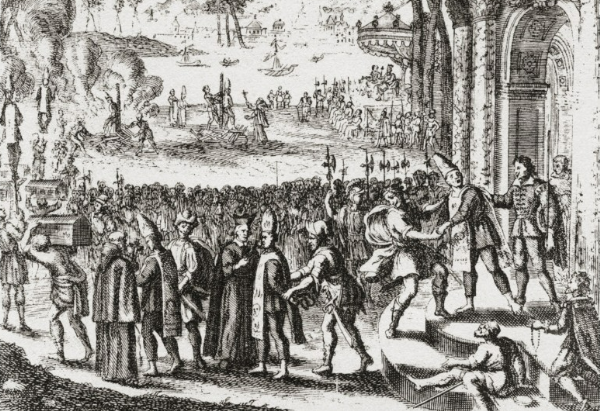The Unnerving Struggle to Remain A Hindu - IV
Total Views |
Marriage is one of the most significant institutions of our society. The ceremony and the rituals are performed with seriousness as well as a lot of enthusiasm. It is an event of social as well as a family gathering. Of course, its role in society cannot be understood by foreign people, who don't comprehend our culture.

The aggressors who came to our country for trade never tried to understand the ethos of the land. Portuguese too wanted to deprive people of idol worshipping and matrimonial rituals. The council organised in 1567 announced that marriage according to Hindu rituals was banned, and even Christians were not allowed to participate in the ceremony, this was treated to be ' total disregard of the Lord's commands '. Of course, King Dom Sebastiano also supported it. Thus Hindus had to go outside the Portuguese-ruled territory to perform traditional Hindu rituals which according to Hindus was an essential aspect. This was very painful, Hindus defeated Jesuit missionaries, and many started settling in places like Fonda and Dicholim.
In 1585, the next council requested the king to ban any fanfare to announce the marriage in public, as it was supposed to baffle the neo-converts. An appeal was made to force people to keep it a small and simple affair with hardly any people participating in it. No temple functionary was allowed to perform the Rituals. The rituals were described as devilish and gods as pseudo-gods. The provision of a fine was made, half of the fine was to be awarded to the informer. Even temple functionaries were to be punished for attending or conducting the ceremony. After the change in the European scenario, permission was granted to conduct the rituals on boats. Money was to be paid, but no Christian was allowed to attend. Of course, this was a small concession offered. In 1701, permission was granted to conduct the ceremony in one's own house, keeping the main door shut.
It took approximately 200 years to earn this freedom with peace of mind. Even Christians too started following the rituals to an extent. Today it is observed that even Christians go to the temples to 'watch the kaul', ( कौल लावणे ) and solemnise the marriage in church.
Church focused on children as they are easy to be deceived and they could hardly understand the ulterior motive. Fondness, attachment etc were just the appearance. Orphans too were targeted and brainwashed. The purpose was to guide them to Christianity. All the costs of these activities of taking care were borne by the government. The number of such centres increased. ( Known as Cathecumenos ) Despite laws, nothing could be done. The 1559 order stated that any child who had no one to take care, of would be handed over to church and baptized.
Officers were appointed and paid by the government. Of course, this did not seem to have helped. In 1582 the order stated that once children attain maturity, they would be taken away from the parents and despite their objection, children were to be baptized. This was to free them ( children ) from the clutches of the Devil. This was to save them! The age of attaining maturity was 7 years.
Once parents were converted, their children had no way to escape baptism. This in a way helped extortion from the rich. Church was not ready to take ' No ' for an answer. Small steps were taken, banning the use of Hindu surnames. The cast was to be noted strictly as Christian. All the pathways to return to the old faith were blocked.
The responsibility for orphans' conversion was given to government officials. Even though the decisions of the councils did not mention it, the administration wanted to go beyond the printed material. The conversion was approved and supported by the political and religious leadership.
Children were always the main targets. This practice continued for almost 2 centuries. (16th to 18th century ) After 3 and a half centuries Hindu way of life started again due to the change in the situation.


